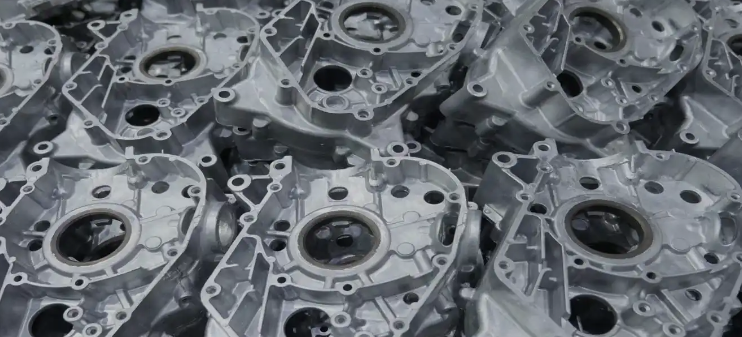From concept to creation: The art of aluminium casting
Team AL Circle
2024-03-21
Casting is an age-old technique in metallurgy. It is one of the most efficient ways of manufacturing desired shapes, patterns, and parts with ultimate precision. Aluminium is a versatile metal with a plethora of properties and is ideal for casting. Hence, manufacturers commonly use it to produce complex structures with utmost accuracy and cost-efficiency. This article covers everything you need to know about aluminium casting.

What is aluminium casting?
The process of pouring molten aluminium into a cavity to make different parts and components is known as aluminium. Since aluminium and some of its alloys have a low melting point, it is the metal of choice for manufacturers and producers. However, once it is cooled, aluminium becomes solid, making the part durable.
What are the different types of aluminium casting:
Aluminium casting can be classified into two parts: expandable casting and reusable casting. In the case of expandable casting, the cast is broken while demolding or removing it. On the other hand, permanent casting is made of metal and used multiple times.
Die casting: One of the most common and popular forms of aluminium casting is die casting. This method is used when manufacturers want to create a 100% accurate and precise product. Here, the molten aluminium is forced into the mould under pressure. Die casting is also a rapid process; hence, it is used widely for commercial purposes.
Permanent mould casting: Here, the mould is made from metals like iron or graphite. This method is usually used for manufacturing complex parts like gears and pumps. Since it requires upfront investment in tools, it is expensive.
Sand casting: Sand casting is also a widely used method of aluminium casting, used to create simple as well as complex parts. It is recognised for being a cheap and rapid method of casting. However, the piece can lack precision and accuracy, requiring further work.
Investment casting: Investment casting, also known as precision casting or lost-wax casting, is a manufacturing process where wax is injected into the die to create a desired pattern. Therefore, it is also known as casting. It is usually used for smaller items requiring extreme precision, like dental equipment, jewellery, etc.
Lost foam casting: Like investment casting, lost foam casting uses polystyrene foam instead of wax.
Why is aluminium casting so popular among manufacturers?
As technology continues to evolve, there are also some advancements in the field of aluminium casting. These improvements will benefit the manufacturers as they prefer aluminium casting because it is:
- Resistant to damage and corrosion: Aluminium is a strong metal that does not corrode or rust easily. When exposed to air, only the surface slightly oxidises.
- Cost-effective: Aluminium casting helps manufacturers save on cost. It makes the production process considerably cheaper. There are several casting methods which are fast and inexpensive.
- Strong and durable: Due to the inherent strength of the metal, aluminium casting is strong and lasts longer despite being lightweight.
- Design flexibility and versatility: Aluminium enables manufacturers to create complex structures. The metal's versatility allows engineers and designers to create custom shapes and designs of various shapes.
How is aluminium casting used in various industries?
Due to its robust properties and multiple benefits, aluminium casting has diverse uses in various industries, including automobile, aerospace, military, and more. Here are four examples of commercial applications of aluminium casting:
Military: The military also uses aluminium casting to make high-quality equipment and parts that meet government standards, are effective and do not harm the users. Missile nose pins and fire suspension housing are examples of aluminium casting applications in the military.
Sports: Golf products like golf ball warmers, clubs and brackets are made with aluminium casting because of the metal's strength and durability. Aluminium casting helps manufacturers produce high-quality products at a lower price.
Automobile & aerospace: Modern vehicles like self-driven cars and electric vehicles have spiked the demand for aluminium castings. It is used to make chassis, battery covers, and different vehicle parts. The aerospace industry also relies heavily on aluminium and its alloys, especially for lightweighting.
Electronic instruments: Aluminium casting is used to develop heat sinks to reduce heat from electronic components. Moreover, aluminium enclosures are made to store and protect delicate electronics.
Aluminium is one of the most abundantly available metals on earth, so it is a go-to raw material in various industries. Moreover, aluminium can be recycled multiple times without losing its properties. Hence, secondary aluminium helps achieve climate neutrality and promotes a circular economy. Secondary aluminium and secondary aluminium alloys are widely used in aluminium casting due to their myriad properties. Modern manufacturers are turning towards aluminium casting to develop eco-friendly, sustainable production methods and new-age products that serve the environment and customers.
Categories
Raw Materials
Scrap
Consumables
Primary Aluminium
Secondary Aluminium
Equipment
Technology
Downstream Products
Finished Products
Utilities
Services
Others
Recent Blogs
Subscribe to newsletter
Connect with us












